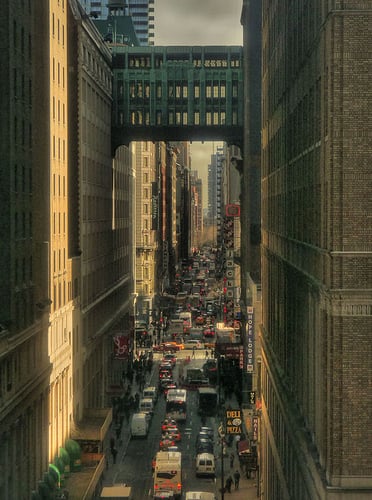
USPIRG’s study finds a misalignment between U.S. transportation spending and actual needs. From joiseyshowaa.
We may be on the cusp of 2015, but transportation policies of state and federal governments are stuck in 2005, says the U.S. Public Interest Research Group (USPIRG). In a study released by the organization in September, researchers discovered that Americans drive no more in total than they did in 2005 and no more on average than in 1997. Rapid increases in driving and congestion nationwide had been steady in the prior six decades, but USPIRG’s recent finding shows that trend has leveled off.
The organization identifies six reasons why:
- Market saturation. The number of cars and licensed drivers per household has decreased dramatically after peaking in the first decade of this century.
- Drop in workforce participation. The percentage of Americans in the workforce has been declining, a slide that’s expected to continue as Baby Boomers age and retire.
- High gas prices. Gasoline costs have climbed for most of the last decade, and experts don’t see them stepping back down any time soon.
- Rising popularity of urban living. For the first time in 90 years, auto-oriented suburban development slowed or halted. City centers have grown faster in this decade than their suburban counterparts.
- Greater use of public transit and other so-called alternative modes. Last year, transit ridership in the United States reached its highest point since 1956. Other non-driving modes, such as bicycling and walking, are also becoming more common, and the emergence of the sharing economy has introduced new transportation options—ridesharing, bikesharing, carsharing—whose influence has yet to be measured.
- The changing tastes of Millennials. Defined as those aged 16 to 34, Millennials are now the largest generation in America, and they averaged 23% fewer driving miles in 2009 than they did in 2001, which is significant because they will be the primary beneficiaries of the transportation infrastructure we build today.
But state and federal governments are focusing their transportation dollars on projects that, according to USPIRG, are outdated, nonexistent, or that have grave impacts on nearby communities, thereby undercutting any advantages they may have had initially. There are, for example, eleven highway projects estimated to cost the public a minimum of $13 billion, though their need or value is questionable. For instance, tolled express lanes planned for Route 470 in Colorado are not likely to produce net benefits for another two decades at the earliest, according to state analysts. The effort is budgeted at $153 million.
USPIRG is calling for a reevaluation of such plans, given changing transportation behaviors and traffic volumes. The group also recommends redirecting transportation funds toward the repair of existing roads and other transportation options besides highway expansion. Investing in public transit or technology that encourages motorists to avoid peak-time traffic, as well as exploring road-pricing measures and revised or new land-use policies, often reduces congestion at lower costs and greater impact. Lastly, USPIRG advocates for better research and data collection, such as revised forecasting models that account for new transportation influences, such as bikesharing, or the changing transportation and living habits of Millennials.